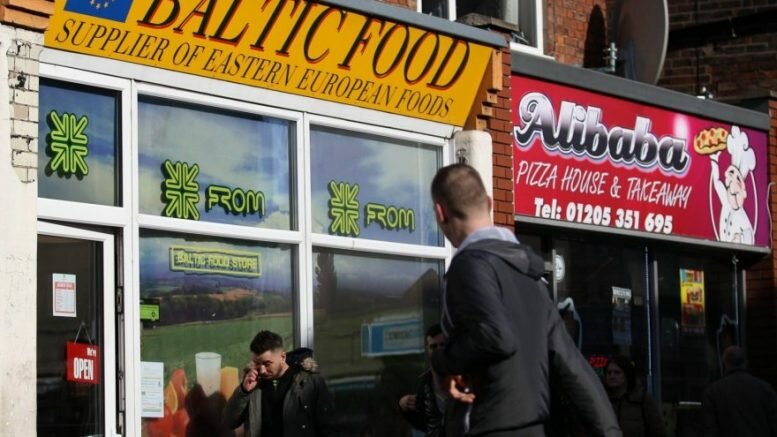By Angele Kadaitiene
Lithuanian Minister of Social Security and Labour Linas Kukuraitis is starting a series of meetings with Lithuanian citizens living in the United Kingdom, as the British parliament fails to decide on an orderly Brexit.
They will be aimed at providing key information to Lithuanian citizens on work, housing, social payments, healthcare and business opportunities in Lithuania, in case some Lithuanians, facing uncertainty in UK, will decide to return to the home country. Furthermore, the meetings will aim at providing the relevant information for those Lithuanians who decide to stay in UK, with emphasis that home country does care.
The Minister will be accompanied by experts from the Social Security and Labour Ministry, the Employment Service, the National Health Insurance Fund, as well as the business promotion agency Versli Lietuva and the migration information centre Renkuosi Lietuva.
According to Bruegel think tank, in 2008-2017 around 155,000 Lithuanians have left the country for other EU countries, a big part for the UK, which accounts for 454,000 of EU citizens, coming to UK from other EU countries, second most popular country for internal migration just after Germany.
Lithuanian Government estimates that today there could be around 200,000 Lithuanians residing in UK.
Net migration inflows, (in thousands)
| Country | Cumulative net inflows 2008-2017 | Cumulative net inflows intra-EU 2013-2017 | Cumulative net inflows intra-EU (20-34 age group) 2013-2017 |
| Belgium | 339 | -22 | 10 |
| Bulgaria | -25 | -102 | -45 |
| Czech | 77 | -14 | n.a. |
| Denmark | 172 | 3 | -2 |
| Germany | 3,791 | 1,016 | 492 |
| Estonia | -5 | -29 | -11 |
| Ireland | -32 | -45 | n.a. |
| Greece | -195 | -183 | n.a. |
| Spain | 3 | -464 | -136 |
| France | 513 | -108 | n.a. |
| Croatia | -92 | -93 | -35 |
| Italy | 2,532 | -125 | -50 |
| Cyprus | 31 | -0.1 | n.a. |
| Latvia | -178 | -68 | -35 |
| Lithuania | -295 | -155 | -85 |
| Luxembourg | 96 | 19 | n.a. |
| Hungary | 155 | -99 | -62 |
| Malta | 59 | 15 | n.a. |
| Netherlands | 277 | -13 | 18 |
| Austria | 459 | 134 | n.a. |
| Poland | -450 | -728 | -268 |
| Portugal | -113 | -115 | n.a. |
| Romania | -615 | -879 | n.a. |
| Slovenia | 35 | -30 | n.a. |
| Slovakia | 21* | 7 | 0.164 |
| Finland | 156 | -13 | -8 |
| Sweden | 701 | 34 | 24 |
| United Kingdom | 2,393 | 454 | n.a. |
“Eksemigrantai” – the Public Enterprise that unites the community of approximately 20,000 emigrants and citizens who have already returned to Lithuania – initiated a survey aiming to measure prevailing moods before the approaching Brexit. As much as 32 % has stated that the main factor making them decide to return is the longing for their homeland, for another 30%, this is determined by the opportunity to be near their close relatives, whereas 20% respondents named children as the most important cause of their resolution.
Worth mentioning, the Lithuanian Government makes an efforts to connect with the emigrants community. It has special program for young graduates of foreign universities, willing to have the professional experience in the civil service of Lithuania, while offering one-year work contracts with attempt to keep the talented Lithuanians close to country interests, even they chose to return back to the West. Indeed, there are positive examples, that Lithuanians, who become well positioned in high profile consultancies, banks, etc. of the foreign countries, keep-up with theirs sentiments while convincing the foreign business to establish branches in Lithuania. Worth mentioning examples of Euromonitor International, Moody’s, Barclay, Google etc., choosing Lithuania as theirs foreign office, not without an advice of the emigrants.
Lithuania respects the human right of its people to move freely within EU and globalised world, and considers the brain circulation rather the brain drain being the reality, while trying to capture the best experiences of its citizens and keeping them close to each other and to the homeland.



Be the first to comment on "Lithuania and Brexit"